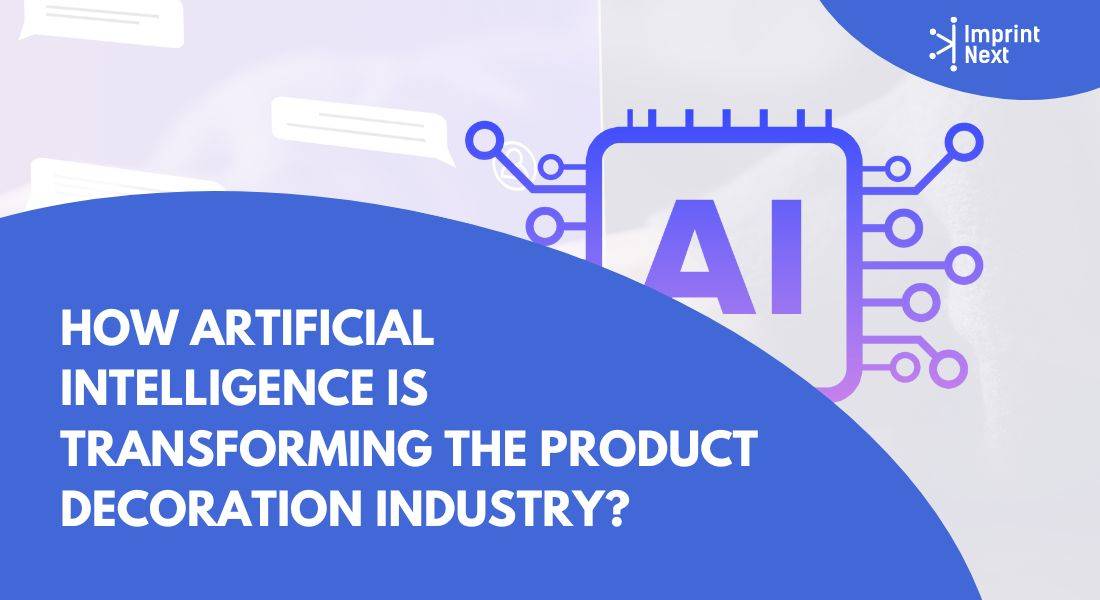
Last Updated on: 9th April 2024, 08:43 pm
The on-demand product personalization industry is getting smarter and faster in delivering services than before. And all the credit goes to artificial intelligence.
AI in product decoration and print on demand industries has expanded its reach both in terms of faster & efficient production and automation to reduce human involvement and ultimately errors.
AI has had a great impact on product decorators who sell customized apparel, signage, promo accessories, drinkware, office items and more gain smarter tools to serve customers. Read on for a look at key ways product decorators can harness ImprintNext AI to boost efficiency, creativity and sales.
1. Streamlining Workflows Through Predictive Analytics:
For businesses who manage numerous suppliers, artists and decorating techniques like embroidery, screen printing and laser etching, production bottlenecks can delay orders or reduce quality.
Want to Boost Your Print Shop Revenue?
Schedule a free consultation
AI predictive analytics help decorate-on-demand platforms flag potential issues before they arise.
By gathering and assessing data on past fulfillment metrics, supply chain hiccups, artwork revision requests and more, AI models identify probable trouble spots. For example, machine learning algorithms may determine a specific supplier has difficulty consistently achieving quality standards for rush orders. Platforms can allocate extra QC checks for said supplier. Or know when artist revision delays will necessitate assigning backups to keep orders moving.
Proactively addressing such chokepoints minimizes waste, helps ensure prompt delivery and satisfies more customers. And with AI continually monitoring emerging order data, predictions grow more accurate over time.


Do you have printers? Are those printers sitting idle?
Become a Print-on-Demand dropshipping app like Printful or Printify. Dropship your merchants' orders.
Unlimited Merchant stores. Dropship and Fulfil Merchants' orders. Manage merchant invoice, sales commission, etc. Merchants sell the designed products in shopify, etsy stores, etc.
Know more2. Saving Labor Through Intelligent Task Automation:
Behind the scenes, product customization firms still rely heavily on manual order processing, artwork approvals, transaction audits and customer service communications. While humans handle complex creative duties, ImprintNext production automation excels at automating repetitive cognitive and administrative tasks.
Intelligent process automation bots can interpret orders, initiate artwork revisions, query suppliers, process payments and execute many other predefined protocols faster and more accurately than humans.
Bots even communicate with customers via chat to handle common inquiries, only escalating to human reps when encountering unique situations.
As AI capabilities advance, smart bots increase productivity gains by taking over an expanding array of responsibilities once requiring dedicated staff. This lets decoration platforms scale without proportional headcount growth.
3. Generative AI Design Capabilities:
While personalized products hinge on unique designs, many customers feel intimidated lacking artistic skills. Traditionally, platforms rely on template graphics libraries requiring only modest text and image customization.
But AI generative design tools now allow anyone to turn vision into reality. Users simply describe a desired scene like “woman meditating on beach at sunset” and AI will generate numerous original vector images matching the description.
In digital creation, AI allows product decorators to offer true one-of-a-kindness from customers lacking drawing talent. Brands benefit from unique designs rather than templated images used by competitors. The AI even produces designs conforming to preferred color palettes, imagery styles or formats necessary for production techniques like sublimation printing.

Boston based custom slide sandal maker has become $10 Million company using an online designer and unique growth marketing.
Read more4. Sales & Marketing Automation:
Traditionally, marketing product customization relies heavily on guesswork. But ImprintNext Sales & Marketing Automation eliminates theorizing by predicting optimal campaigns. By assessing data on past lead sources, conversions by product type, abandoned cart fallout and more, AI models determine highest-ROI approaches.
Moreover, it identifies customer micro-segments to target and tailors messaging to resonate with each group based on interests and behavior patterns. It calculates likely response rates and sales for promotions by seasonality, markets, delivery channels and other factors.
Rather than rely on assumptions, decorators deploy ultra-targeted campaigns with product recommendations, pricing and creative optimized for reach sub-audience. The AI continually self-tunes based on ongoing customer response analytics to increase average order values.
5. Potential Threat Detection & Security:
As customer and order data pours into decoration firm databases from numerous websites, apps and integrated vendor software, more vulnerabilities arise for cyber attacks to strike. But AI cybersecurity protect brands by ceaselessly patrolling networks.
Powerful machine learning algorithms analyze system events to build behavior profiles of users, hardware lifecycles and typical network traffic levels. Detected activity deviations trigger alerts for unauthorized access attempts or malware. Along with pattern matching against known attack vectors, behavioral analysis spots zero-day threats based on suspicious combinations of anomalous behaviors.
Whenever abnormalities signify a successful system infiltration, AI-assisted response isolates and eliminates intrusions. It involves steps like revoking user credentials, shutting down compromised endpoints and scanning connections for lateral movement. It also recommends long term patches to remedy vulnerabilities exploited in the incident.
The Way Forward for Personalized Products:
AI use has begun across today’s leading on-demand product decoration platforms and will only accelerate in coming years. Forward-looking providers who use AI early will gain decisive competitive advantage as the technology delivers compounding workflow, customer experience and business optimization benefits over time.
Platforms that lag in adoption however face decline as savvier competitors leverage AI capabilities they lack. For product decorators, the choice is clear. Now is the time to futureproof your business by getting started with artificial intelligence.













